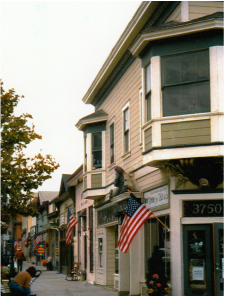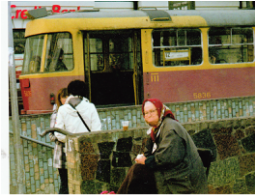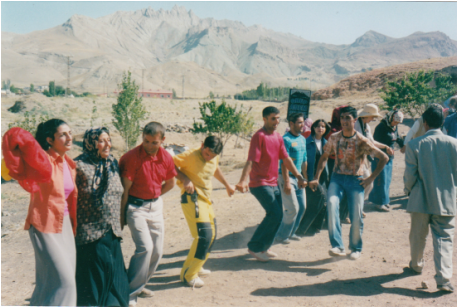
I’ve got to know my neighborhood and see how it changes over time. This house is getting a new roof, that one has a new fence. Another house is getting a new foundation (this is earthquake country, after all) and the one across the street is adding a second story. A block away, a garden of native plants is emerging, replacing the old lawn. And along the way I’ve met people, got to know them a little, even have become friends with some of them.
This town and neighborhood were designed for getting around on foot. Automobiles were relatively new when it was growing, so it wasn’t assumed that folks would shuffle from house to car, drive to a point, get out, do whatever they needed to do, then drive back to their door. They’d walk or take the streetcar, unlike today’s suburbs with no sidewalks or places to walk to, just streets lined with big garages.
A few blocks away, a long street offers a supermarket, post office, drugstores, clothing stores, coffee shops, bakery, several types of restaurants, banks, a video rental store, a bagel shop, an independent book store, an office supply store, a dry cleaners, and a jewelry store. A branch library stands just two blocks away the other direction. I’ve become friends with people who work there and on speaking terms with people who live on those blocks.
During my morning walk to buy a newspaper, I often meet the same people each day, sometimes on the way to work, other times walking their dogs. Later in the day, I see people working in their yards, shopping, walking their dogs again, pushing strollers, at the post office, having a cup of coffee. Often when we pass folks say Hi, exchange pleasantries, stop for a short conversation. Gradually, we learned a little about each other. Some of us became good friends, visiting each other, doing things together. I also became friends with clerks in the market, the woman at the post office, the man who owns the stationery store.
Often, when I’m working in the garden in front of my house, people walk past, smile, say hello, comment on the plants and flowers, whatever they feel like talking about. Sometimes, they’re neighbors or other acquaintances, but just as often we’re meeting for the first time. A few words easily turn into a conversation, an invitation, a friendship.
Today, there’s lots of talk about polarized government, religious and racial hatred, economic injustice, anger leading to violence. Maybe people need to get out of their cars, walk around, meet each other, talk, get to know each other, in their own neighborhoods and beyond. Meet people at home, in other cities and towns, other countries, too.
Can you fire a weapon at someone you’re friends with? Can you let someone you’ve shared a beer or meal with starve? Just questions. No answers, yet.


 RSS Feed
RSS Feed